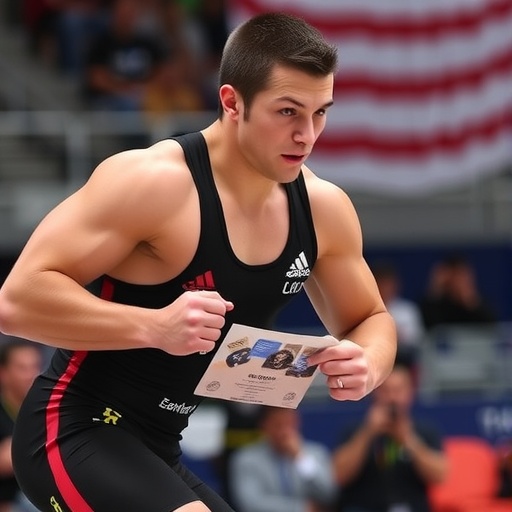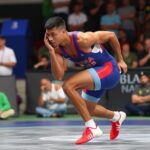Otto Black Powers into Quarterfinals at U23 World Championships as Payton Jacobson Eyes Bronze in Greco-Roman Wrestling
In a thrilling display of grit and technique, American wrestler Otto Black has propelled the U.S. Greco-Roman team forward at the U23 World Championships in Novi Sad, Serbia, securing two decisive victories and advancing to the quarterfinals. Meanwhile, teammate Payton Jacobson stands on the brink of hardware, gearing up for a bronze medal match that could cap off an impressive run for the young U.S. contingent.
The U23 World Championships, a premier international competition for wrestlers under 23, kicked off earlier this week, drawing top talents from over 50 nations to showcase the future of Greco-Roman wrestling. For the U.S., these championships represent a critical proving ground, where emerging stars like Black and Jacobson battle not just for medals but for spots on future senior national teams. Black’s journey so far has been a masterclass in dominance, while Jacobson’s resilience has kept the American hopes alive in the lower brackets.
Otto Black‘s Unyielding Assault on the Mats
Otto Black, a 22-year-old powerhouse from Colorado representing the 87kg weight class, wasted no time making his mark at the U23 World Championships. In his opening bout, Black faced off against Hungary’s Bence Barany, a seasoned competitor known for his explosive takedowns. What followed was a clinical performance: Black controlled the match from the whistle, executing a textbook gut wrench throw that scored four points early on. He maintained pressure throughout, adding a two-point takedown in the second period to seal a 7-0 technical superiority victory in just under four minutes.
Black’s second match against Iran’s Amirreza Khosravi was even more commanding. Trailing briefly by a single point, Black unleashed a series of par terre attacks, including a powerful arm drag that flipped the script. By the end, he had amassed 10 points to Khosravi’s 2, advancing with another technical fall. “It’s all about preparation and believing in your training,” Black said post-match, his voice steady amid the roar of the international crowd. “The coaches at the OTC in Colorado Springs drilled us on these scenarios, and it paid off.”
Statistics from the event highlight Black’s prowess: he’s averaged over 8 points per match while conceding fewer than 1, a rare feat in the cutthroat world of Greco-Roman wrestling. His style—blending raw strength with precise footwork—has drawn comparisons to Olympic medalist Jordan Burroughs, though Black humbly deflects such praise. Raised in a wrestling family in Fort Collins, Colorado, Black first gained national attention at the 2022 Junior World Championships, where he placed fifth. This year, his focus has been laser-sharp, training alongside elite athletes at the U.S. Olympic Training Center.
Black’s advancement to the quarterfinals pits him against a formidable opponent from Russia in the next round, scheduled for later today. A win there would guarantee at least a bronze medal and propel him into the semifinals, where gold is within reach. For U.S. fans, Black embodies the resurgence of American Greco-Roman talent, a discipline historically overshadowed by freestyle but gaining momentum.
Payton Jacobson’s Gritty Road to Bronze Contention
While Black cruises in the upper echelons, Payton Jacobson, a 21-year-old from Iowa in the 67kg division, has carved his path through adversity at the U23 World Championships. Jacobson’s tournament began with a narrow quarterfinal loss to Turkey’s Emrah Turkmen, a 5-3 decision that left him winless in the championship bracket but very much alive in the repechage. Undeterred, Jacobson roared back with a pair of consolation wins, first pinning Kazakhstan’s Alikhan Yeskaliev in 2:45 and then outlasting Georgia’s Giorgi Tsiklauri 4-2 in a tense semifinal repechage match.
These victories have earned Jacobson a spot in the bronze medal match against Azerbaijan’s Nihad Mammadov, set for tomorrow morning. “Losing that quarterfinal stung, but it’s wrestling—you adapt or you go home,” Jacobson reflected in a team media session. “My coaches reminded me that every match is a new opportunity, and I’ve got family and fans back home cheering me on.” Jacobson’s background adds depth to his story: a standout at Iowa State University, where he compiled a 45-10 record over two seasons, he’s no stranger to high-stakes competition. His Greco-Roman transition from freestyle in high school has been seamless, thanks to guidance from USA Wrestling’s development program.
Event data underscores Jacobson’s tenacity; he’s wrestled five matches already, spending more cumulative time on the mat than any other U.S. competitor. In Greco-Roman, where upper-body throws and defensive positioning reign supreme, Jacobson’s ability to scramble out of tough spots has been key. A bronze would mark his first senior international medal, boosting his profile ahead of the 2024 Olympic trials. For the U.S. Greco-Roman team, Jacobson’s performance is a beacon of consistency amid a field dominated by Eastern European powerhouses.
U.S. Greco-Roman Squad’s Collective Surge in Serbia
The successes of Otto Black and Payton Jacobson are part of a broader wave for the American team at the U23 World Championships. Held at the SPC Vojvodina arena in Novi Sad—a city with a rich wrestling heritage dating back to the 1970s—the event has seen the U.S. secure three wins on Day 2 alone, with two more wrestlers advancing to medal rounds. In the 63kg class, Dalton Roberts notched a 6-1 upset over Egypt’s Ahmed Ismail, while 97kg competitor Mason Parris dominated with two technical falls.
USA Wrestling’s head coach for the event, Andie Hrovat, praised the team’s preparation. “We’ve invested heavily in Greco-Roman development over the last five years, and it’s showing,” Hrovat said. “These athletes are training smarter, with a focus on international rules and styles. Otto and Payton exemplify that commitment.” The U.S. entered the championships with modest expectations, having medaled only twice in the U23 Greco-Roman category in the past decade. This year’s roster, however, boasts depth: 10 wrestlers qualified through rigorous national trials, many hailing from powerhouse programs like Penn State and the University of Nebraska.
Contextually, the U23 World Championships serve as a pipeline to the senior Worlds and Olympics. Past participants like Gable Steveson and Helen Maroulis transitioned seamlessly from this level to global stardom. For the U.S., the event in Serbia is particularly poignant; it’s the first major international outing post the Tokyo Olympics, where Greco-Roman yielded no medals. Stats from United World Wrestling indicate that over 300 athletes are competing, with Greco-Roman sessions drawing packed houses and live streams surpassing 100,000 views per day.
Off the mat, the American team has bonded over shared cultural experiences in Serbia, from sampling local cevapi to team-building sessions. This cohesion has translated to performance, with the U.S. ranking fourth in the Greco-Roman medal standings after two days—a marked improvement from 2022’s 12th place.
Coaches and Experts Break Down Key Strategies
Behind the triumphs of Black and Jacobson lie meticulous strategies honed by a cadre of elite coaches. USA Wrestling’s Greco-Roman director, Justin Ruiz—a two-time Olympian—emphasized the importance of adaptability. “In Greco-Roman, it’s not just about power; it’s about reading your opponent and exploiting weaknesses,” Ruiz explained. “Otto’s throws against Iran were straight out of our playbook, focusing on high-amplitude lifts to score big.”
For Jacobson, the emphasis has been on endurance. “Payton’s repechage run shows his mental toughness,” added Iowa State’s wrestling coach Kevin Dresser. “We simulated these marathon sessions in practice, building his gas tank for exactly this.” Experts like wrestling analyst Jordan Oliver, a former world silver medalist, highlighted the tactical edge Americans are gaining. “The U.S. is closing the gap with countries like Russia and Iran by incorporating more international sparring,” Oliver noted in a pre-event podcast. “Black’s footwork is elite, and if he maintains it, gold is realistic.”
Quotes from the wrestlers themselves add a personal touch. Black, reflecting on his training regimen, shared: “I wrestle every day, but it’s the visualization—picturing these wins—that keeps me driven.” Jacobson echoed the sentiment: “This trip to Serbia has been eye-opening; the competition pushes you to new levels.” Broader analysis from the event reveals trends: Greco-Roman matches this year average 15% more points than in 2021, thanks to rule tweaks encouraging aggression.
In terms of preparation, the U.S. team arrived in Serbia two weeks early, acclimating to the time zone and scouting opponents via video breakdowns. Nutritionists tailored high-protein diets suited to the rigorous schedule, while sports psychologists addressed pre-match jitters. These holistic approaches are yielding results, positioning American wrestling as a rising force.
Future Horizons for U.S. Wrestling Stars
As the U23 World Championships progress, the implications for Otto Black and Payton Jacobson extend far beyond Serbia. A strong finish could fast-track Black to the 2024 Olympic team, where the 87kg spot remains hotly contested. Jacobson, with a bronze in hand, would solidify his candidacy for senior Worlds selection in September. USA Wrestling officials are already eyeing these results for funding boosts; the organization has pledged increased support for Greco-Roman programs if medals are secured.
Looking ahead, both wrestlers plan to compete in the Beat the Streets series and national camps, refining skills against top foes. Black aims to bulk up slightly for senior weight classes, while Jacobson targets a full-time move to the Olympic Training Center. For the broader U.S. landscape, this event signals a golden era: with youth programs expanding in states like California and Texas, the talent pool is deeper than ever.
Fans can follow the action live on United World Wrestling’s streaming platform, with medal matches promising high drama. If Black and Jacobson deliver, it won’t just be personal victories—it’ll inspire a new generation of American wrestlers to dream big in Greco-Roman. The road from Novi Sad to Paris 2024 is just beginning, and the U.S. is charging forward with momentum.








